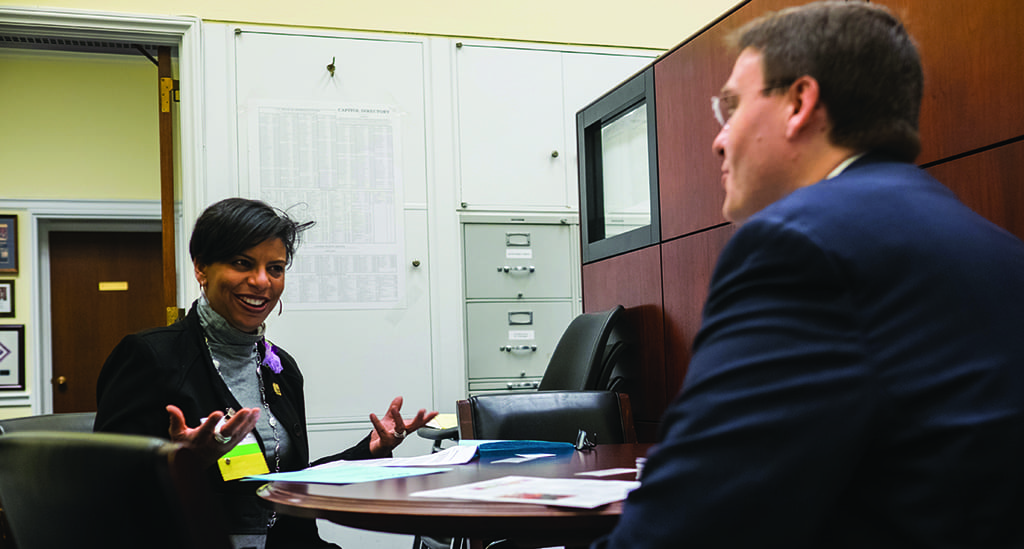
Stacie Lee Banks of Lee’s Flower and Card Shop, Inc. in Washington, D.C., discusses industry issues with a member of the staff of Congresswoman Eleanor Holmes Norton.
During the Society of American Florists’ 39th Annual Congressional Action Days (CAD), March 11-12, floral industry professionals will present four main “asks” to lawmakers: stop a drastic minimum wage increase that will harm small business and threaten jobs, ensure adequate labor is available to the floricultural industry, continue support for essential research, and maintain essential government statistical reporting on the industry.
SAF lobbyists, including Senior Director of Government Relations Shawn McBurney, and other key experts will explain the issues — and how to talk about them in a way that brings it home to lawmakers and their staff. “It really comes down to business owners sharing their stories with their elected representatives and key aides about how the issues affect them, their employees and their districts,” McBurney said.
CAD participants will include business owners from all segments of the industry — retailers, growers, wholesalers and suppliers. Last year, nearly 100 floral industry members from, 25 states and the District of Columbia participated in CAD.
What will this year’s participants ask their legislators to do? Here’s a rundown of each of the issues:
Minimum wage: Oppose doubling the federal minimum wage to $15 with automatic increases, which has been introduced in the House and Senate.
Floral industry businesses often pay more than the minimum wage, currently $7.25 per hour, to attract and retain valuable employees. But mandating double that rate would not be sustainable and could lead to reduced hours and/or layoffs. With very narrow profit margins, floral businesses cannot absorb increased labor costs. If forced to raise prices, they may turn away consumers who have endless options for their discretionary income.

Gustavo Gilchrist
of Kennicott Brothers in Chicago and Dave Mitchell of Mitchell’s Flowers & Events in Orland Park, Illinois, talk with a congressional staff member.
The increase also would hurt entry-level workers unable to obtain jobs because employers would have to cut positions. Raising the minimum wage drives up other related costs including taxes, insurance and benefit packages.
McBurney recommends business owners remind lawmakers that, while $15 an hour might not seem high in certain cities, although it is, “it is a much different case for small towns throughout the country.”
Immigration reform: Oppose stand-alone mandatory electronic verification, or E-Verify legislation, which would deprive the industry of its workforce, exacerbating an already critical shortage of workers.
The industry depends on a shrinking number of manual, often seasonal, laborers to harvest fragile flowers, fruits and vegetables. Many of those workers are undocumented.
Instead of imposing E-Verify by itself, suggest that lawmakers focus on providing realistic ways to establish a legally authorized workforce and guest worker program as immigration policies are developed. These include enforcing immigration laws at the border, improving verification of employment authorization and creating a program to provide access to an adequate number of workers needed by our economy.
The Floriculture and Nursery Research Initiative (FNRI): Ensure that FNRI continues receiving support. Securing $1 million in funding for FNRI was the biggest “win” from SAF’s 2018 lobbying efforts. The research, much of it conducted at universities, seeks to improve ornamental horticulture’s environmental and resource management practices and strategies, and enhance insect, disease and weed management, while reducing pesticide use and decreasing waste at production facilities through recycling and other methods.
Among the research successes to date: Longer lasting cut flowers, studying how growers can use less water and conserve energy, combatting invasive insects and reducing the use of plastics.

David Armellini and the SAF delegation from Florida meet with staff members in the office of Sen. Ben Nelson (D
“This huge accomplishment for the floral industry would not have happened without the support and hard work of SAF members,” McBurney said. “It proves that SAF members’ efforts pay off.”
Floriculture researchers need continuing support. Research is vital to the industry and an investment in the future, McBurney said. “We must keep ongoing projects alive and address new challenges.”
The Floriculture Crops Report: Support funding to continue publishing this annual report by the National Agricultural Statistics Service (NASS), part of the Agriculture Department.
As an important sector of the economy, the floriculture industry relies on the information collected for the report. For budgetary reasons, it was not published in 2017 and 2018. In an SAF victory last year, NASS received funding to again publish the Floriculture Crops Report, with 2018 data scheduled to be released later this year.
“Since experience has shown there is no guarantee the government will maintain the report, it is critical to keep lobbying for it,” McBurney said. No other data is reported for annual bedding and garden plants, potted plants, foliage plants, cut flowers and greens. The last report, based on 2015 data published in 2016, was 58 pages chock full of valuable information. It details wholesale value, number of producers, hired workers and growing area of growers with sales of $10,000 or more in 15 states with the most floricultural production. Growers use it to identify market trends and opportunities. Researchers also use the data.
“The report helps build a stronger future for the industry’s small businesses,” McBurney said.
For CAD details and to register, click here. The SAF room rate is $239 single/double per night plus tax. The cut-off date for guaranteeing the rate is Monday, Feb. 18. (Note: The CAD hotel sold out last year.)
Early bird registration ends Friday, March 1. It offers a $55 discount ($295 for members, $395 for non-members). CAD registration includes an additional free registration for a second person from the member’s company who has never attended before. To take advantage of this offer, contact meetings@safnow.org.
Christy O’Farrell is a contributing writer for the Society of American Florists.
